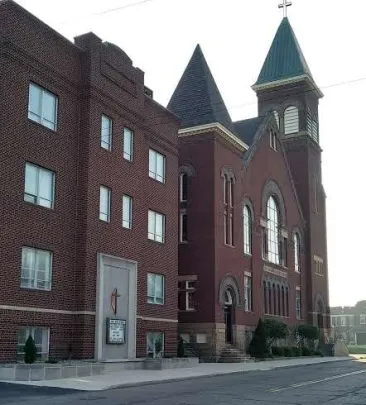
Click here to watch the livestream of this worship service: https://youtu.be/l-G8XgQToQw
(Note: Due to technical issues, no podcast is available for this service)
Power in Distress
January 01, 2023*
(New Year’s Day)
By Pastor John Partridge
Isaiah 63:7-9 Matthew 2:13-23 Hebrews 2:10-18
When the magi arrive in Jerusalem, Matthew includes a curious phrase in his description of King Herod’s reaction. Matthew says, “After Jesus was born in Bethlehem in Judea, during the time of King Herod, Magifrom the east came to Jerusalem 2 and asked, “Where is the one who has been born king of the Jews? We saw his star when it rose and have come to worship him.”
3 When King Herod heard this he was disturbed, and all Jerusalem with him.” (Matthew 2:1-3)
Herod was disturbed… and all of Jerusalem was disturbed with him.
Obviously, there are many reasons why King Herod would have been disturbed, but why would the entire city be disturbed with him? Historically and biblically, we know that Herod was incredibly paranoid about maintaining his grip on power. He had at least one of his parents and some of his children killed because he felt threatened by them. He was not a nice man. And so, it isn’t surprising that he was disturbed by the arrival of the magi and their question about a new king being born. There are several theories that have been forwarded about why the entire city would have been disturbed with him, and the simplest of these is that when the king wasn’t happy, everyone worried because… he was not a nice man. There are other theories, and I have a favorite, but that will have to wait for another day.
And that leads us to our Old Testament reading in which we find that God, in addition to being good, kind, and compassionate, also feels distress when his people are distressed. We begin this morning reading from Isaiah 63:7-9 where we hear this:
7 I will tell of the kindnesses of the Lord,
the deeds for which he is to be praised,
according to all the Lord has done for us—
yes, the many good things
he has done for Israel,
according to his compassion and many kindnesses.
8 He said, “Surely they are my people,
children who will be true to me”;
and so he became their Savior.
9 In all their distress he too was distressed,
and the angel of his presence saved them.
In his love and mercy, he redeemed them;
he lifted them up and carried them
all the days of old.
God’s reaction to his feeling of distress, was to bring healing to those who were distressed. God chooses to bring rescue and redemption to all of humanity so that he could relieve our distress. This is unlike how King Herod reacts to distress in Matthew 2:13-23 where we read this:
13 When they had gone, an angel of the Lord appeared to Joseph in a dream. “Get up,” he said, “take the child and his mother and escape to Egypt. Stay there until I tell you, for Herod is going to search for the child to kill him.”
14 So he got up, took the child and his mother during the night, and left for Egypt, 15 where he stayed until the death of Herod. And so was fulfilled what the Lord had said through the prophet: “Out of Egypt I called my son.”
16 When Herod realized that he had been outwitted by the Magi, he was furious, and he gave orders to kill all the boys in Bethlehem and its vicinity who were two years old and under, in accordance with the time he had learned from the Magi. 17 Then what was said through the prophet Jeremiah was fulfilled:
18 “A voice is heard in Ramah,
weeping and great mourning,
Rachel weeping for her children
and refusing to be comforted,
because they are no more.”
19 After Herod died, an angel of the Lord appeared in a dream to Joseph in Egypt 20 and said, “Get up, take the child and his mother and go to the land of Israel, for those who were trying to take the child’s life are dead.”
21 So he got up, took the child and his mother, and went to the land of Israel. 22 But when he heard that Archelaus was reigning in Judea in place of his father Herod, he was afraid to go there. Having been warned in a dream, he withdrew to the district of Galilee, 23 and he went and lived in a town called Nazareth. So was fulfilled what was said through the prophets, that he would be called a Nazarene.
When God feels our distress, he feels distress as well, and chose to send a rescuer to relieve us. But when Herod feels distress, his solution is to kill as many people as necessary to comfort himself that he has removed the source of his distress. Throughout the story, God’s focus is on rescuing Mary and Joseph, rescuing Jesus, his appointed rescuer, and through him rescuing all of us. The focus of God is on us, while the focus of Herod is only on himself.
We see that same focus in Hebrews 2:10-18 as God, through the rescue and restoration available through Jesus Christ, removes yet another source of fear and distress for his people, and for all who would come to him.
10 In bringing many sons and daughters to glory, it was fitting that God, for whom and through whom everything exists, should make the pioneer of their salvation perfect through what he suffered. 11 Both the one who makes people holy and those who are made holy are of the same family. So, Jesus is not ashamed to call them brothers and sisters. 12 He says,
“I will declare your name to my brothers and sisters; in the assembly I will sing your praises.”
13 And again,
“I will put my trust in him.”
And again, he says,
“Here am I, and the children God has given me.”
14 Since the children have flesh and blood, he too shared in their humanity so that by his death he might break the power of him who holds the power of death—that is, the devil— 15 and free those who all their lives were held in slavery by their fear of death. 16 For surely it is not angels he helps, but Abraham’s descendants. 17 For this reason he had to be made like them, fully human in every way, in order that he might become a merciful and faithful high priest in service to God, and that he might make atonement for the sins of the people. 18 Because he himself suffered when he was tempted, he is able to help those who are being tempted.
God perfected Jesus Christ through the suffering that he endured on earth, but because of his perfection, God created a path for his people to be purified, perfected, and made holy. And through that holiness, we can become the brothers and sisters of Jesus, the children of a holy and perfect God. Once again, if God was anything at all like King Herod, he could have easily eliminated his distress by eliminating us. But instead of doing that, God chose to set us free from our anxiety and fear of the future by eliminating the power of death itself.
The writer of Hebrews reminds us that to accomplish that, God had to become like us. Not a little bit like us, but exactly like us, fully human, so that he could make atonement for the sins of his people. Jesus had to become like us, suffer like us, be tempted like us, fear like us, dream like us, feel loss like us, mourn and cry like us, worry like us, feel pain like us, bleed like us, die like us, and in every other way… know what it is to be human. And because he has done those things, he knows what it is like to be us and he is able to offer us help, rescue, and restoration as no one else can.
When King Herod was in distress, he killed people until his worries went away.
But when God felt the distress of humanity, he suffered death himself so that he could rescue us and remove our distress.
And that is why, like Isaiah, we should be and say, I will tell of the kindnesses of the Lord, the deeds for which he is to be praised, according to all the Lord has done for us – yes, the many good things he has done for …”
…Us.
Did you enjoy this?
Please LIKE and SHARE!
Click here to subscribe to Pastor John’s blog.
Click here if you would like to subscribe to Pastor John’s weekly messages.
Click here to visit Pastor John’s YouTube channel.
*You have been reading a message presented at Christ United Methodist Church on the date noted at the top of the first page. Rev. John Partridge is the pastor at Christ UMC in Alliance, Ohio. Duplication of this message is a part of our Media ministry, if you have received a blessing in this way, we would love to hear from you. Letters and donations in support of the Media ministry or any of our other projects may be sent to Christ United Methodist Church, 470 East Broadway Street, Alliance, Ohio 44601. These messages are available to any interested persons regardless of membership. You may subscribe to these messages, in print or electronic formats, by writing to the address noted, or by contacting us at secretary@CUMCAlliance.org. These messages can also be found online at https://pastorpartridge.com . All Scripture quotations, unless otherwise indicated, are taken from the Holy Bible, New International Version®, NIV®. Copyright ©1973, 1978, 1984, 2011 by Biblica, Inc.™ Used by permission of Zondervan. All rights reserved worldwide. www.zondervan.comThe “NIV” and “New International Version” are trademarks registered in the United States Patent and Trademark Office by Biblica, Inc.™


